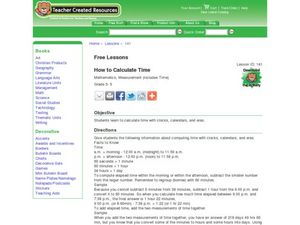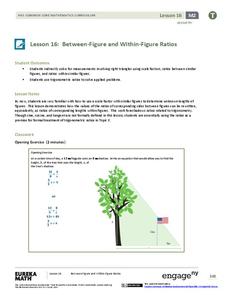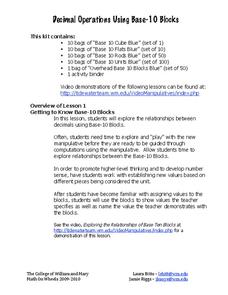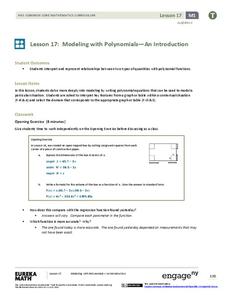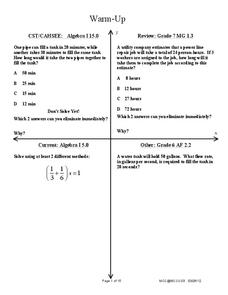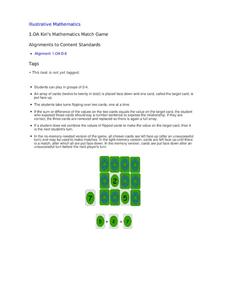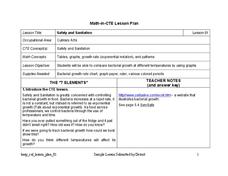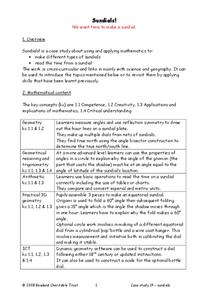Curated OER
Go Fish!
Students share a bowl of goldfish crackers. In this lesson on sharing, students see how a limited resource goes furthest when it is evenly shared. Students are allowed to take as many crackers as they would like, and then in contrast,...
Curated OER
How Old Is Illinois?
High schoolers use fossils found in rocks to determine the age of the strata between Rock Island and Chicago. Pupils pretend they are geologists. They must determine the age of all rock layers between the Mississippi River and Lake...
Federal Reserve Bank
Credit Reports—and You Thought Your Report Card Was Important
Get the facts about credit and take a close look at what factors into a consumer credit report with this fantastic lesson. Your pupils will read informational texts, read sample financial documents, and discuss the advantages...
Mary Pope Osborne, Classroom Adventures Program
Mummies in the Morning Egyptian pyramids, hieroglyphics
Visit the Magic Treehouse and take your class on a trip through time with a reading of the children's book Mummies in the Morning. Using the story to spark an investigation into Egyptian culture, this literature unit engages...
Curated OER
Calculating Elapsed Time
Students calculate elapsed time in a series of activities. In this calculating time lesson, students view a Cyberchase video that demonstrates how to calculate elapsed time. Activities include counting, subtracting and regrouping in base...
Curated OER
How to Calculate Time
Students complete a worksheet. In this calculations lesson, students learn factual information about computing time with clocks, calendars and eras. Students show their knowledge by completing a worksheet.
Howard Hughes Medical Institute
Color Variation over Time in Rock Pocket Mouse Populations
A species-specific look at natural selection, the resource herein examines how adaptations have helped the population of rock pocket mice survive in a changing landscape. To begin, middle or high schoolers watch a 10.5 minute video,...
EngageNY
Bean Counting
Why do I have to do bean counting if I'm not going to become an accountant? The 24th installment of a 35-part module has the class conducting experiments using beans to collect data. Learners use exponential functions to model this...
EngageNY
Between-Figure and Within-Figure Ratios
Tie the unit together and see concepts click in your young mathematicians' minds. Scholars apply the properties of similar triangles to find heights of objects. They concentrate on the proportions built with known measures and solve to...
Workforce Solutions
30 Seconds
Thirty seconds are all scholars have to develop an engaging commercial to showcase their talents and experience within a specific occupation. Pairs work collaboratively to keep each other on time to deliver information speedily and ask...
College of William and Mary
Decimal Operations Using Base 10 Blocks
Let's get this block party started and learn about decimals! Here are four main lessons that teach the operations with decimals while using base 10 blocks to provide a hands-on learning approach. Supplemental worksheets and other...
Illustrative Mathematics
The Napping House
How many people and animals can cram into a single bed? Find out with this cross-curricular math and language arts lesson. Following along with a reading of the children's book The Napping House by Audrey Wood, young mathematicians...
EngageNY
Modeling with Polynomials—An Introduction (part 2)
Linear, quadratic, and now cubic functions can model real-life patterns. High schoolers create cubic regression equations to model different scenarios. They then use the regression equations to make predictions.
EngageNY
Modeling a Context from Data (part 2)
Forgive me, I regress. Building upon previous modeling activities, the class examines models using the regression function on a graphing calculator. They use the modeling process to interpret the context and to make predictions...
National Research Center for Career and Technical Education
Lou-Vee-Air Car
Who said teaching a STEM lesson had to be challenging? Incorporate a career and technology-centered car build into your upcoming force lesson plan, and your class will be moving down the road in no time! Pupils practice...
Curated OER
Measuring Speed With iMovie
Students record each other running, walking, throwing a ball, or doing a similar activity for a set distance. They import the video clips into iMovie. They compute how long it took in miles per hour.
Curated OER
Geometry Vases: Ceramics Lesson
Geometric shapes are used in math and in art. Learners discuss the various names, dimensions, and attributes of geometric shapes, then apply that knowledge to design a vase. They use 3-D shapes to make a cubist-style vase out of clay.
West Contra Costa Unified School District
Work Problems – Bar Models
Why do we have to do so much work? Scholars learn how to set up bar models to represent a situation involving work. They use these bar models to help set up equations with rational coefficients to solve the problem situation.
EngageNY
Solving Problems in Two Ways—Rates and Algebra
Build confidence by using multiple approaches to problem solving! This resource uses a visual and algebraic approach to solving application problems. A discussion is included about efficient approaches to different problems.
University of Colorado
Are All Asteroids' Surfaces the Same Age?
Did you know scientists can tell the age of an asteroid by looking closely at its craters? This final activity of a six-part series focuses on two asteroids, Gaspra and Ida, in order to demonstrate the concept of dating asteroids....
Illustrative Mathematics
Kiri's Mathematics Match Game
Learning math is so much more fun when it involves playing games. Following the rules of the classic game Memory, young mathematicians flip over two cards at a time as they look for numbers whose sum or difference is equal to the value...
National Research Center for Career and Technical Education
Safety and Sanitation
Your microbiologists explore the graphing of exponential growth functions using bacteria, like e. coli and salmonella, in a well-written, career and technology lesson.
Bowland
Sundials!
Time to learn about sundials. Scholars see how to build sundials after learning about Earth's rotation and its relation to time. The unit describes several different types of possible sundials, so choose the one that fits your needs — or...
University of Colorado
Looking Inside Planets
Researchers use scientific data to understand what is inside each of the planets. The first in a series of six, this lesson builds off of that concept by having pupils use a data table to create their own scale models of the interiors of...
Other popular searches
- Time Zone Lesson Maths
- Math Lessons Time Duration
- Time Math Lesson Plans
- Math Lessons Time
- Maths Time Lesson
- Christmas Math Lesson on Time
- Math Lessons on Time
- Maths Time Lesson Plans
- Math Lessons Telling Time







